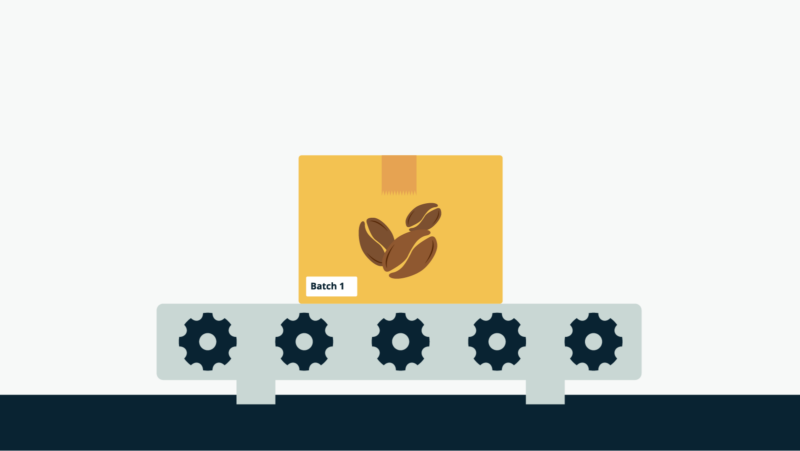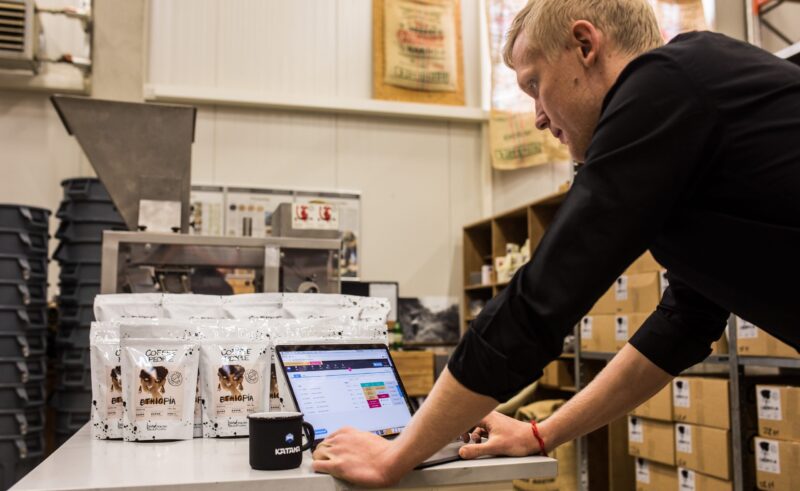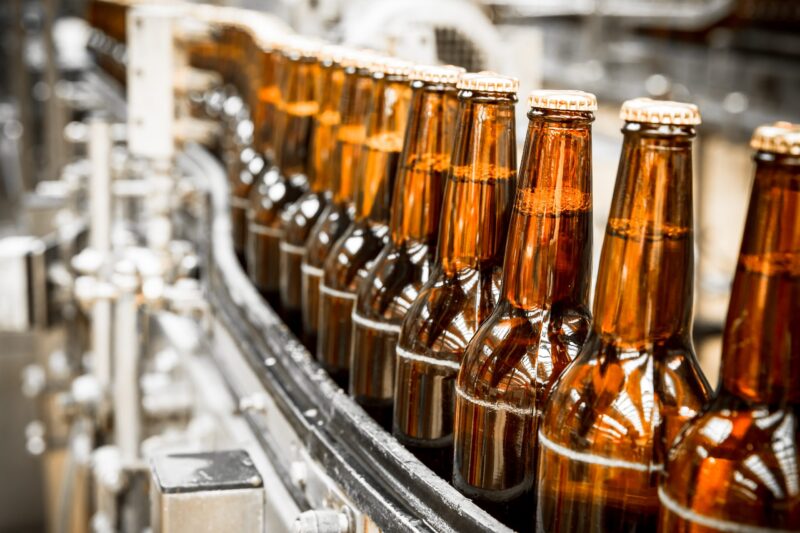How to choose the best ERP system for the food industry

Ioana Neamt

The food and beverage industry is not for the faint-hearted. Businesses in this sector have a lot more on their plate besides delicious meats and cakes. By this we mean that they have to adhere to very strict regulatory standards to ensure the quality and safety of their products, not to mention they need to ensure timely delivery of said products to their customers. Producing, handling, storing, and shipping perishable products can be quite challenging, so businesses tend to rely on tools and technologies that make their lives easier, and most of the time, this includes an ERP.
What is an ERP?
An enterprise resource planning (ERP) system is a complex software platform used by businesses to integrate and manage core processes in real time. These systems can easily and seamlessly centralize data from various departments — including financing, human resources, sales, and supply chain management — into a unified database that’s easy to manage and navigate. This connectivity can improve information flow and operational efficiency, making businesses more productive and ensuring transparency.

Why do you need a specialized food ERP?
A specialized ERP that caters to the specific needs of the food and beverage industry is essential for businesses in this sector, helping them adhere to rigorous regulatory requirements.
A dedicated food ERP can offer tools that cater specifically to the food and beverage industry, features relating to batch processing, quality control, waste reduction, recipe management, and more. This enables businesses in this sector to adhere to safety standards, handle and store delicate and perishable inventory efficiently, and deliver high-quality products to their loyal customers.
How to choose an ERP for the food and beverages industry
Choosing an ERP for the food and beverages industry requires a strategic approach that focuses on the unique demands and complexities of the sector, while also factoring in the specifics of your business.
First, it’s crucial to select a system that offers traceability and compliance features, enabling adherence to regulatory requirements such as the FDA, the HACCP, and other local or international food safety standards. The ERP should provide end-to-end visibility across the entire supply chain, from raw material sourcing to final product delivery, ensuring comprehensive tracking and quality assurance, not to mention customer satisfaction.
Then, you need to consider the ERP’s capability to handle industry-specific processes, such as batch processing, recipe management, and shelf-life tracking. The system you choose should facilitate efficient inventory management, minimizing waste and optimizing stock levels for the perishable goods in your inventory. Easy integration with existing systems, scalability, and user-friendliness are also critical factors that can tip the scales in favor of one ERP over another.

During the selection process, you’ll have to take into consideration some key criteria that are relevant to your specific industry and operation, including the ones on the list below.
- Regulatory compliance and traceability — Ensuring you meet food safety standards and enabling complete supply chain visibility
- Industry-related capabilities — Look for batch processing, recipe management, waste management, and shelf-life tracking functionalities
- Inventory management — Opt for systems that minimize waste, optimize perishable stock levels, and keep track of your inventory in real time
- Integration and scaling — Make sure that the ERP of your choice can integrate with current systems and scale as your business grows
- User-friendliness — Choose a system that is intuitive and easy to adopt across the organization
- Vendor support — Consider the vendor’s knowledge of the food and beverages industry and their support services specific to this niche
The benefits of an ERP for businesses in the food industry
Implementing an ERP system for a company in the food industry offers numerous benefits, from enhancing operational efficiency and ensuring regulatory compliance, to enabling transparency into the entire supply chain and forecasting demand.
Below we’ll have a look at the key benefits of a specialized ERP for the food and beverage industry:
- Enhanced traceability — Complete tracking, from suppliers to finished products, ensures food safety and efficient recall management. This comprehensive visibility not only helps meet regulatory compliance, but also builds consumer trust by guaranteeing product authenticity and quality.
- Optimized inventory management — Real-time visibility into stock levels and expiration dates reduces waste and ensures product freshness. By accurately forecasting demand and managing supply levels, businesses can prevent overstocking and stockouts, leading to cost savings and customer satisfaction.
- Improved production planning — Streamlined manufacturing processes minimize downtime and increase efficiency. The ability to plan and schedule production runs more effectively results in higher productivity, reduced operational costs, and the flexibility to quickly adapt to changes in demand.
- Better financial management — Integrated accounting and operations provide detailed financial insights and facilitate strategic decision-making. With real-time financial data at your fingertips, you can identify cost-saving opportunities, monitor profitability, and ensure budget compliance.
- Advanced analytics — Data-driven decision-making is enabled through trend analysis and demand forecasting. Leveraging these insights allows businesses to anticipate market shifts, optimize pricing strategies, and tailor their offerings to meet consumer preferences.
- Operational efficiency — Automation of routine tasks and reduction of human errors, free up resources for strategic initiatives. By streamlining administrative processes and improving data accuracy, employees can focus on innovation, customer service, and other high-value activities that contribute to business growth.

Top ERP systems for the food and beverage industry
Several ERP systems are well-regarded for their application in the food and beverage sector due to their specialized features and industry-specific capabilities. Below are our top picks when it comes to ERP systems suitable for the food and beverage sector.
Katana
Katana’s food ERP software simplifies daily operations for food companies, offering essential features regardless of product type. It allows you to create multiple product recipes, track perishable stock effectively, and collaborate with warehouse teams to streamline production processes and enhance efficiency.
Below are just some of the key features that Katana’s food ERP system has to offer businesses in the food and beverage sector.
- Live inventory management
- Real-time master planning
- A dedicated shop floor mobile app
- Accurate costing
- Ecommerce integrations (eg. Shopify, WooCommerce, BigCommerce)
- Accounting integrations (eg. QuickBooks, Xero)
- Shipping integrations
From consistent recipe management, lot traceability, and production improvement to timely shipping and regulatory compliance with safety standards, our product makes it easy for players in the food and beverage companies to stay ahead of the competition.
Get a demo of Katana and learn more about its capabilities for the food and beverage industry!
BatchMaster
BatchMaster provides an ERP solution that caters to the needs of the food and beverage industry. The ERP is a solid choice for businesses that co-pack, private-label, or produce their own line of prepared food or specialty items. It helps these businesses adhere to industry-specific requirements related to production, inventory, quality, costing, FDA compliance, warehousing, and BRC/SQF lot traceability. The product also blends easily with existing technologies, including SAP Business One, Microsoft Dynamics GP, Sage 100 or 300, and QuickBooks.
Aptean Food and Beverage ERP
Aptean is another solid choice if you’re looking for an ERP for the food or beverage industry. It offers specialized tools and resources related to various segments of the industry, including bakeries, dairy products, produce and farming, frozen or prepackaged foods, snacks, and more. The product offers real-time shop floor data to optimize inventory management, planning, scheduling, and production processes, various maintenance and forecasting tools, advanced data analytics and reporting, and other similarly delicious features.
Deacom
ECI Deacom focuses primarily on small food and beverage companies, particularly those in ecommerce and direct-to-consumer (DTC) sales. Its processes are optimized to meet the specific needs of these sectors, however, its scalability may be limited for more complex food and beverage operations. Even so, Deacom is well-suited for smaller companies transitioning from platforms like QuickBooks, offering cost-effective implementation solutions on a budget.

Ioana Neamt
Table of contents
Get inventory trends, news, and tips every month
Get visibility over your sales and stock
Wave goodbye to uncertainty with Katana Cloud Inventory — AI-powered for total inventory control